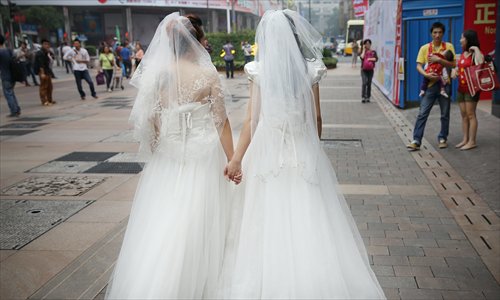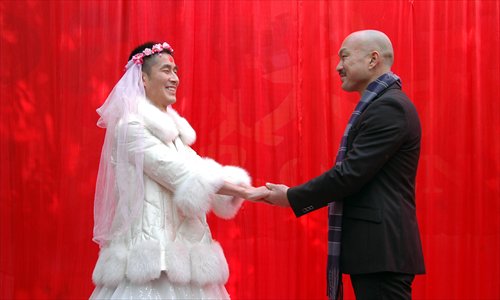$93m gay app deal raises questions over future of LGBT services

Photo: CFP

Photo: CFP

Many gay people are no longer shy about showing intimacy in China. Photo: CFP
A Chinese game developer's recent announcement that it will purchase a US-based gay social networking app has boosted Chinese gay Internet companies' confidence as well as triggered a new round of discussion on the status of the gay community.
Shenzhen-listed Chinese game developer Beijing Kunlun Wanwei Technology announced on January 11 that it will spend about $93 million on 98.4 million shares of the Los Angeles-based Grindr Holding Co. The Grindr app allows users to meet others in their area, and is geared toward gay and bisexual men.
"The announcement of the deal does not only bring LGBT-related stocks into the A share market, more importantly, it sends out a signal that the gay community is everywhere, both in the economy and society," Li Kui, chief brand officer of danlan.org, a gay information website, told the Global Times.
With more and more LGBT-focused Internet companies taking off in China in recent years, the community is becoming more visible. However, some think that this visibility and greater acceptance may mean that many gay-oriented services will become obsolete.
Expanding scope
Danlan.org, originally a gay information website set up in 2000, has developed several Internet products aimed at gay people including Blued, a social networking app. Danlan claims it has a total of 5 million registered users.
The company is currently focusing on its HIV prevention and anti-discrimination campaigns on one hand and developing the company commercially on the other, according to Li.
"We will make more commercial decisions this year, on advertisements and membership fees. To have the company listed on the stock market is our ultimate goal," Li said.
Like other Internet companies, more and more gay websites are developing their mobile presence. Feizan.com, established in 2010 and dubbed the "gay Facebook," has also developed a dating app called ZANK.
"We are trying to get both economic and social value through offering gay people better services including entertainment and traveling," Ling Jueding, founder of feizan.com, told the Global Times.
Some other gay Internet companies have evolved from focusing on their core market to engaging with the rest of society.
Jiang Hui, one of the early members of Aibai Culture and Education Center (ACEC) which runs the gay information website aibai.com, said that ACEC has evolved from just providing information to training teachers and firms.
"When aibai.com was founded in 1999, very few people knew about the LGBT community including the community itself, but now people can learn about it through various channels," Jiang said. Starting two years ago, ACEC began to teach middle school teachers about sexology and gay issues so their students can make better, safer decisions.
An increasing number of students nationwide are HIV positive. According to a report by China Youth Daily, more than 14,000 people aged 15 to 24 contracted HIV in 2015, up 10 percent year on year. The majority contracted the virus through unprotected gay sex.
ACEC is also working on helping more enterprises to be gay-friendly. They have organized training for human resources professionals to promote gay rights, as well as to encourage them to recruit more gay people, Jiang said.
Accepted out of existence?
Some companies said that the success of gay-oriented companies improved the public's understanding of the LGBT community, but increasing acceptance does not mean China no longer needs products geared towards the gay community.
"It's just like women's products. We understand women, but still have women-focused apps and websites. Different groups have different needs, and the existence of gay products has nothing to do with social acceptance in this sense," Ling said.
Jiang however believes that the gay market actually allows the community to hide themselves from others, and that a fair and tolerant society does not separate people based on their sexual orientation.
"I have doubts about some gay products, such as gay fashion, gay nursing homes and even gay finance. Their existence is based on the idea gay people cannot be treated equally," Jiang said. With China becoming a more tolerant society, many such products may not find their market, he added.
However, many are still prejudiced toward the LGBT community, such as associating all gay people with HIV and not recognizing same-sex marriage, gay rights activists said.
In that sense, some professional LGBT services are still needed in China, such as legal consultation on discrimination, child adoption and AIDS prevention, Jiang said.
Newspaper headline: Pink profits